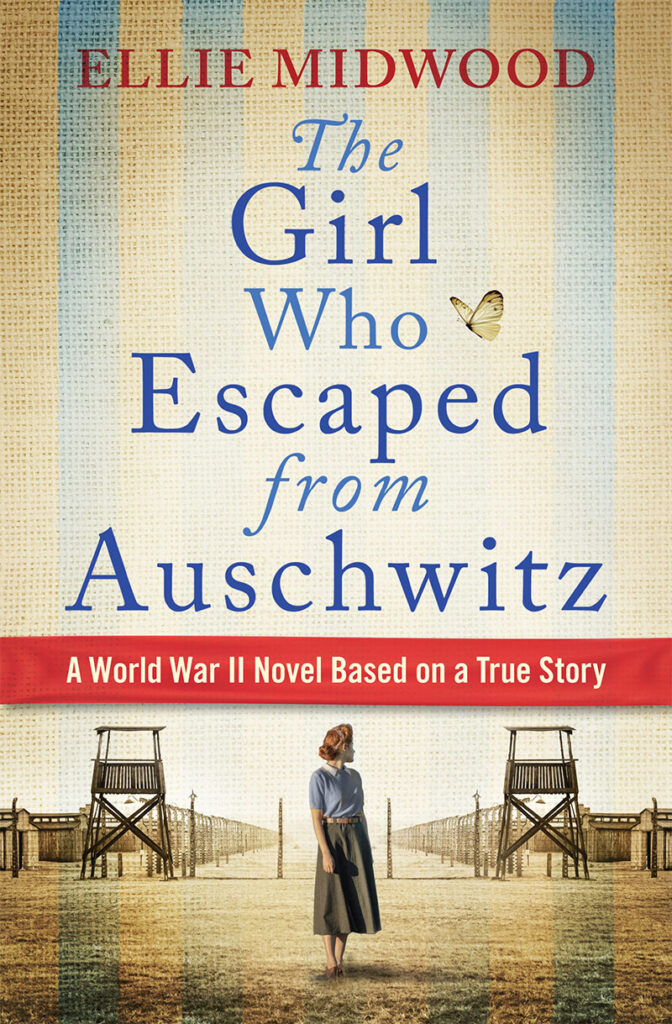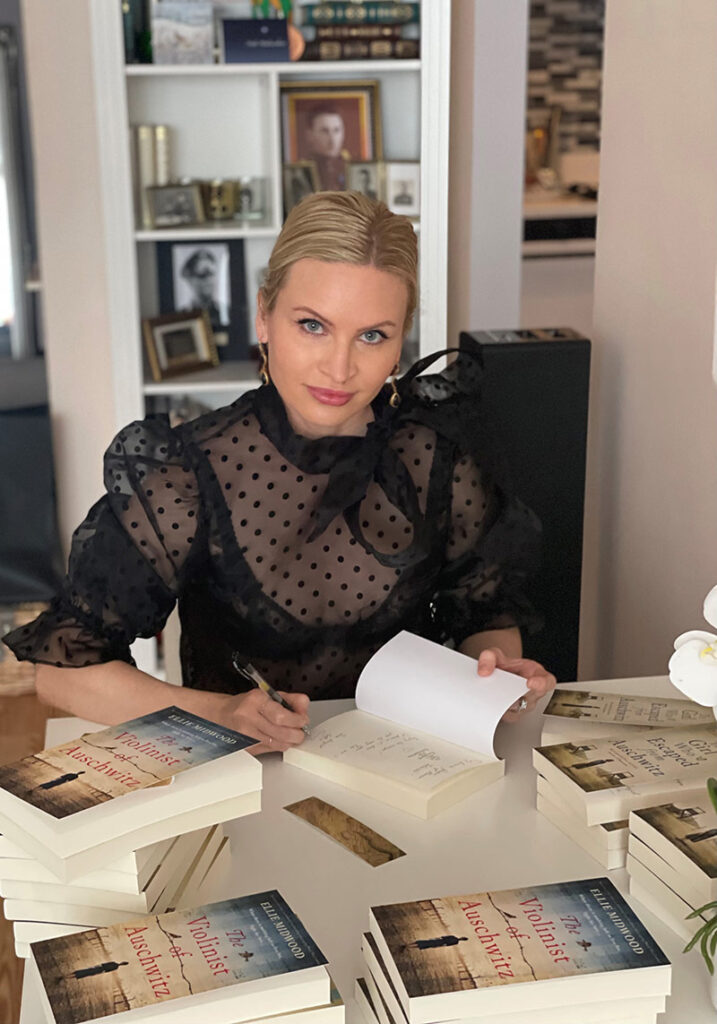
It is timely considering the Jewish holidays are just around the corner. It shows how survival was of the utmost importance.
Mala Zimetbaum wasan interpreter for the SS. But unlike the Kapos she uses her position to save as many lives as she can, from smuggling scraps of bread to those desperate with hunger, to warning those straight off the trains what to say to avoid Mengele’s clutches.
Edek Galinski is known as inmate 531, is a camp veteran and a Polish political prisoner. Though he looks like everyone else, with a shaved head and striped uniform, he’s a fighter in the underground Resistance. And he has an escape plan. Edward makes Mala believe in the impossible. That despite being surrounded by electric wire, machine guns topping endless watchtowers and searchlights roaming the ground, they will leave this death camp.
This book will take readers on an emotional rollercoaster ride. They will laugh, cry, have hope, and then disappointment as they take the journey with these unforgettable heroes.

Elise Cooper: How did you get the idea for the story?
Ellie Midwood: I first began noticing Mala’s name being mentioned by different survivors and historians while researching the Holocaust for my other books. And the more I saw her name in different sources, the more I began wondering why so many people remembered her as someone truly special, someone who either helped them directly or indirectly, through her own example that resisting inside the death camp was not only possible but sometimes necessary. Soon, I concentrated my research solely on her and discovered a person of such incredible strength and compassion, her story simply begged to be told to a wider audience. And of course, Mala’s story wouldn’t be complete without Edek—her love and her fellow conspirator. That’s pretty much how the plot for The Girl Who Escaped from Auschwitz was born.
EC: How much is true?
EM: Most of it. I tried sticking to as much historical fact as I possibly could dig out from all the sources available, including the Auschwitz Museum itself. Mala’s and Edek’s locks of hair are still on display there and I urge all of my readers who shall ever visit the museum to ask the curators to see them and to hear the couple’s incredible true story from the museum historians themselves. But everything starting with Mala’s and Edek’s life stories to the timeline of events in the camp, their relationship with other inmates and the SS, the development of their personal relationship and the escape itself—it’s all based on fact.
EC: How would you describe Edek?
EM: Edek is a survivor. He was among the first inmates transported to Auschwitz, which made him a “camp veteran” by the time he met Mala and began plotting their escape. In Auschwitz, where most inmates died within weeks after their arrival (if they weren’t gassed upon arrival), avoiding death for so long was something truly remarkable. Throughout the years Edek carefully navigated the camp establishing a trusting relationship with the sympathetic SS guard Lubusch (who later aided his escape) and other inmates who came to his aid, just like he came to theirs in time of need. Edek was very well-liked by other inmates, approachable, always in good humor and very savvy. He wasn’t afraid to take risks and had a defiant streak in him—a trait which, no doubt, brought him and Mala closer together as she was a rebel herself.
EC: How would you describe Mala?
EM: Mala, just like Edek, knew how to navigate the complex Auschwitz hierarchy to gain trust of several high-ranking SS officials and make use of their favoritism to aid as many people as possible. She was a selfless and compassionate person, ready to part with her own last shirt to help those in need, but at the same time she was incredibly strong and defiant, her rebellious nature reaching its apogee when she slapped an SS official in one of the chapters (the events based on real fact mentioned by several Auschwitz survivors, much to my own astonishment!). Mala was a fighter and a brilliant woman who was taken from the world too soon, but she certainly left a legacy after herself and I couldn’t be happier that more and more people are learning about this incredible woman.
EC: Please explain the quote that reflected the “Old” Mala versus the “current” one and how the Holocaust had changed her.
EM: It refers to her in the past as idealistic, slightly naïve, survivor, intellectual, and direct. The incarceration aged her beyond her years, undoubtedly. Mala became much more reserved, watchful, always on edge, always waiting for a metaphorical ax to drop. Uncertainty of her very life, where tomorrow was never promised, put her in a very dark place mentally and she certainly became severely depressed, but her own woes never stopped her from helping those who had it even worse. She had been an idealistic Zionist fighter before but now that fight had taken a more personal tone. All at once, simply surviving was an act of resistance against the Nazis and the SS, but Mala managed to take it even further, inspiring a new uprising in the camp that went down in history of the Holocaust. No wonder so many people remembered her years later. She was truly a remarkable woman.
EC: What was the relationship like between Edek and Mala?
EM: They were lovers, friends, and fellow conspirators who relied on one another in the most difficult of times. They trusted each other without any reservation since planning something as daring as an escape from a death camp required unconditional trust. They also had their more light-hearted moments when they teased one another as another means of support in the hellish place to which they were both confined and that ability to see light even in the darkest of situations made me admire them even more as a couple.
EC: There is a quote in the book about achieving normalcy?
EM: You mean this one, “She wanted to see him because he was the only person who could still make her laugh in a spiritless place that belonged to the dead. She needed him to be near because his strength gave her strength, made her believe in the impossible…” Edek was one of the main reasons Mala saw hope in the situation that was otherwise hopeless and desperate. As I mentioned above, she was severely depressed and the more time passed inside the walls of the camp, the more chances there were she could have succumbed to the darkness around her and simply given up, like many others did before her. But it was Edek who planted an idea of an escape into her mind and once again made her dream of life outside Auschwitz. It was that light at the end of the tunnel that gave her the desire to live and fight—alongside him—and go down fighting if needed, but die as a fighter, not as a helpless victim anymore.
EC: Besides physical pain the Nazis liked to inflict emotional pain such as humiliation, make them submissive, reduce them to not human but animals. Is that how you also saw the Nazis?
EM: Absolutely. In most cases, the most sadistic SS members volunteered for service in death camps so it’s no wonder that they took their twisted, perverse pleasure in humiliating their helpless victims both physically and emotionally. From meaningless jobs meant to exhaust and rob the inmates of their already depleted strength to outright punishments and physical abuse such as camp “exercises” during which inmates were made to hop over each other’s heads, run in rain and mud for hours or hurl rocks from one pile to another just to return them back to their original place hours later, or simply made to stand roll-call in subzero temperatures while holding heavy rocks over their heads in their outstretched hands. Everything in Auschwitz was aimed at breaking not only the body but the spirit as well.
EC: Do you think there were any “kind” SS guards?
EM: There were a few sympathetic guards among the SS, one of which was Edward Lubusch. He was an SS man who treated inmates under his charge with compassion and kindness and was even sent for “re-education” to a special camp for such “politically unreliable” SS men as Lubusch. However, the re-education didn’t do anything to change him whatsoever and he returned to Auschwitz even firmer in his position to help the prisoners under his charge however he could. He played a major role in Edek’s and Mala’s escape and later escaped himself to join the partisans.
EC: What role did Wieslaw play in the book and what was the relationship like between him and Edek?
EM: His closest friend was Wiesław Kielar, who later wrote a memoir about his and Edek’s years in Auschwitz that was of great help to me when writing Edek’s chapters.
They were best friends who arrived in the camp together and managed to survive for several years because they could rely on each other. Both resourceful, quick-minded and observant, they formed an almost brotherly bond that transcended ordinary friendship. It was with Wiesław, that Edek was planning to escape first, but in the end, Wiesław willingly offered his position to Mala so that his best friend and his beloved could leave the camp together. It goes without saying that such selflessness and readiness to sacrifice his own freedom for his friend’s sake is truly worth admiration. It was an honor writing Wiesław’s chapters.
EC: Do you think with this quote on page 352, “Tell me why aren’t you on the front? Why aren’t you fighting someone who can fight back? Because you are a coward…You’re a school bully…” Did she try to give the humiliation back to the Nazis?
EM: In this instance Mala simply spoke her mind. She told the Nazi guard exactly what she thought of him after observing his behavior and didn’t mince her words as she had nothing else to lose. A lot of SS guards volunteered for the camp duty precisely because they wanted to avoid the front and possibly being killed or maimed in combat, so she simply uncovered that uncomfortable truth to him and the others present. And yes, most of these SS guards were indeed bullies who enjoyed tormenting and humiliating those who couldn’t stand up for themselves and were basically powerless against their tormentors.
EC: What do you want readers to get out of the story?
EM: First and foremost, it’s a story of personal strength and refusal to give up even in the most horrendous circumstances, but at the same time it’s a story of a more personal nature—of love that became solace in the hell on earth and sustained two human beings with its sheer force. I feel, accuracy is of utmost importance when writing historical fiction and it’s my duty as an author to write as closely to real facts as possible, to not only honor the memory of those I’m writing about, but to educate my readers as well.
EC: Next book: Title, when will it come out, storyline?
EM: The next book that is currently in the works at Bookouture is the novel based on a true story of Dora Schaul, a German woman who joined the French Resistance and was instrumental in uncovering the entire office of the Lyon Gestapo including the Butcher of Lyon, the infamous Klaus Barbie, himself. It’ll come out January 19, but as for the title, we have yet to reveal it so stay tuned and subscribe to Bookouture newsletter or my own which is listed on my website at elliemidwood.com
THANK YOU!!
